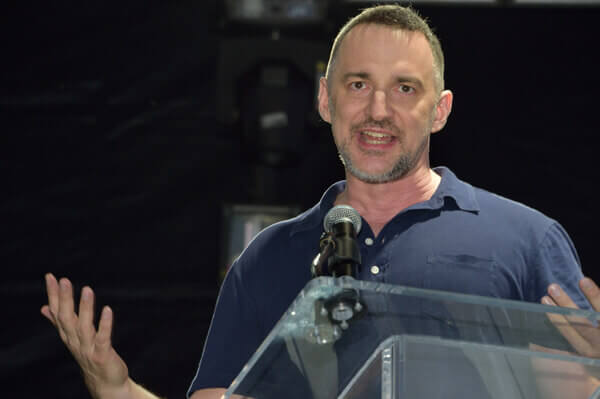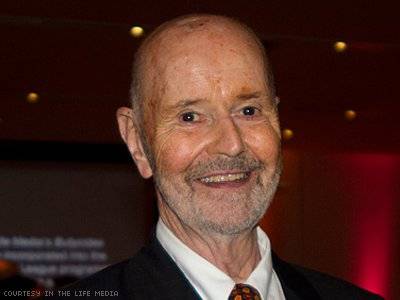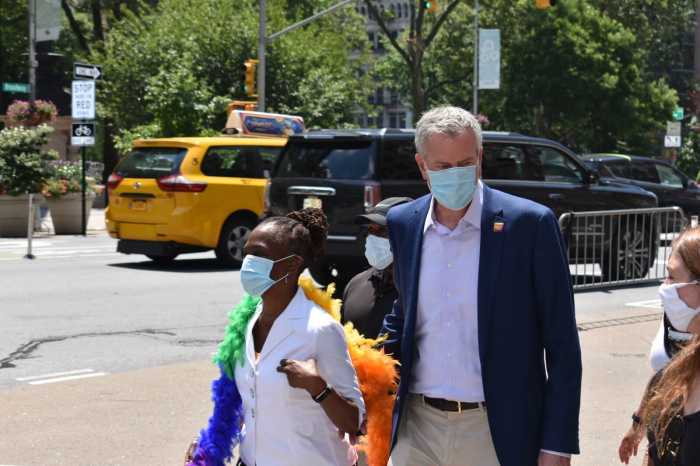Henry van Ameringen, an out gay philanthropist who tapped into his fortune to steer millions of dollars to LGBTQ causes for decades, died on September 9 at the age of 90.
While van Ameringen was initially known as an executive and served on the board of directors for his father’s company, International Flavors and Fragrances, he opted to utilize his wealth for the greater good in 1987 when the HIV/ AIDS crisis had a crushing grip on the community. He subsequently built on that generosity, often writing checks for large sums of money to benefit the community without being asked.
Matt Foreman vividly recalled meeting van Ameringen for lunch in 1995 in the West Village, at the time when Foreman was the executive director of the New York City Anti-Violence Project (AVP).
“We talked about the surge in anti-LGBTQ violence and at the end of the meal he just casually flipped over a check face-down,” Foreman, who remained in touch with van Ameringen up until his death, told Gay City News. “I just looked at it and it was for $100,000. The thing people don’t realize is that a $100,000 gift to an LGBTQ organization of any size back then was simply unbelievable.”
Community remembers out gay philanthropist for his selfless support for queer, other marginalized communities
Foreman and others who knew van Ameringen remembered him as someone who was willing to selflessly open his wallet without expecting anything in return except for a pledge to make sure the money was properly utilized.
“He never wanted credit,” Foreman said. “And he was so intently devoted to the most marginalized people in our community. People of color, Black men living with HIV/ AIDS… He was exceptional not only in the level of his generosity but his humbleness.”
Van Ameringen’s philanthropic organization, the van Ameringen Foundation, also funds a range of programs including mental health services and early intervention initiatives for communities in need. He was known to touch different corners of the queer community, from homeless youth to seniors and even filmmakers who sought to bring LGBTQ history to the homes of Americans from coast to coast. Many said he was also mindful of racial injustice and let that be known in the way he allocated his funds.
In the early 1990s, van Ameringen became a supporter of In the Life Media, which created the PBS TV newsmagazine “In the Life” that highlighted queer causes, stories, and history. He became a key donor of that project because he viewed it as an important vehicle through which Americans could learn about LGBTQ folks at a time when the community had far less visibility.
“We chaired ‘In the Life’ together for many years and became fast friends,” Jayne Baron Sherman, a theater and film producer, said in a Facebook post following van Ameringen’s death. “He was particularly supportive not just of LGBT issues and people, but of those marginalized as well.”
Van Ameringen continued to view television and film as an important tool to advance queer rights up until his death. Katherine Linton, a film and television producer who produced “In the Life” and most recently produced an MSNBC documentary released last year called “Stonewall! Rebellion,” said he provided her with a development grant for that film last year and made her promise that it would “tell our story well.”
“I always wanted Henry to like what I did, because all he wanted was for our community to be treated equally and with dignity,” Linton said in a social media post.
Sherman and others noted van Ameringen’s straightforward approach over the years. She praised his “wit and direct manner,” which contributed to his well-established reputation for getting straight to the point when dealing with important issues.
“He was absolutely no bullshit,” Foreman said. “He would be like, ‘Yes, I like that,’ or ‘No, I don’t.’ He would not waste your time. There are a lot of donors you have to talk to over and over again. It was either yes or no. If it was no, it wasn’t in any kind of negative way. It was just no.”
Carl Siciliano, the founder and former executive director of the homeless queer youth housing and services group Ali Forney Center, told Gay City News that contrary to other donors, asking van Ameringen for money was not how he opened his wallet. Rather, he would inform Ameringen about the most pressing needs facing marginalized communities “and he would almost always come to the table.”

Siciliano recalled a meeting with van Ameringen in 1995 shortly after Siciliano had been hired to be the program manager of a drop-in center in Times Square called Safe Space. A young individual who was feeling suicidal sought assistance at the drop-in center and that client’s case manager kept interrupting van Ameringen and Siciliano’s meeting with updates on that case. Siciliano helped walk the case manager through the situation, which clearly caught the attention of van Ameringen.
“At the end of the meeting, [van Ameringen] said, ‘I have to say I was so impressed with how you and the case manager were being so thoughtful, so that’s why I’ve decided to give you a grant,’” Siciliano said.
Then, in 2002, when Siciliano was getting the Ali Forney Center off the ground, he met with van Ameringen for lunch and the pair discussed the plight of queer homeless youth, including the HIV/ AIDS crisis and substance use issues plaguing young people in the community.
“He pulled out his checkbook and wrote a check for $35,000 and that got us through our first six months,” Siciliano said, underscoring the impact Ameringen had on the organization.
Van Ameringen even chipped in an extra $50,000 to the Ali Forney Center when the organization was navigating the early days of the coronavirus pandemic in March, said Siciliano, who stepped back from the leadership of the organization earlier this year.
The broad impact of van Ameringen’s philanthropy was evident in a 2018 report outlining the top funders for LGBTQ issues, which ranked his foundation seventh in the top 10 list of domestic funders of queer issues.
LGBTQ groups acknowledged his generosity and heaped praise on him following his death. Griot Circle, a Brooklyn-based organization that serves queer seniors of color across the city, mourned his loss in a written statement on September 10.
“Yesterday, the world lost a great person, supporter, and funder of LGBTQ organizations, Henry van Ameringen,” Griot Circle noted. “Mr. Ameringen was a believer in the mission of GRIOT Circle providing advocacy and support to LGBTQ elders of color and his philanthropy also supported other Black and Brown LGBTQ initiatives. All of us at GRIOT extend our deepest condolences to his family, friends, and associates. Rest in Power.”
The National Center for Transgender Equality (NCTE) similarly remembered a man who the group described as “our friend,” saying that “the LGBTQ community has lost a giant in our struggle for equality.”
“For over 30 years, Henry has been an unmatched champion of people in need, and he offered his support frequently,” NCTE said in a written statement. “He was kind and generous, and a fighter for his values — often encouraging others to join him in the fight. He truly believed in our work and his support of the trans community was deeply appreciated. Henry has helped so many in our community and he will be greatly missed by us all. #RestinPower.”
Gay Men’s Health Crisis (GMHC), another organization that received donations from van Ameringen, said he most recently supported the “Deep South Porject,” which sought to provide funding for HIV/ AIDS service providers in Mississippi and other Southern states.
The LGBT Community Center in Manhattan also expressed “great sadness” following the death of “our longtime friend and generous supporter.”
Lambda Legal, which has been at the forefront of major LGBTQ legal cases, credited Ameringen for bolstering the LGBTQ rights movement and bringing much-needed funds to the community in times of need.
“Quite simply, our movement would not be where it is today if not for Henry van Ameringen: there has been no major advance in the fight for justice for LGBTQ people and everyone living with HIV in which his philanthropy did not play a role,” Kevin Jennings, the CEO of Lambda Legal, said in a written statement following van Ameringen’s passing. “His philanthropy was never driven by ego or a need for attention but rather by a genuine desire to try to improve the world, and all he asked of grantees in return for the hundreds of millions he gave away was that we use his funds wisely and well.”
Ameringen, who lived in the West Village for more than three decades and had a home in upstate Hudson, is survived by his spouse, T. Eric Galloway, along with six nieces and nephews. Donations in his name can be made to Fountain House (fountainhouse.org), a New York City mental health services organization, or Lambda Legal (lambdalegal.org).
To sign up for the Gay City News email newsletter, visit gaycitynews.com/newsletter.



































